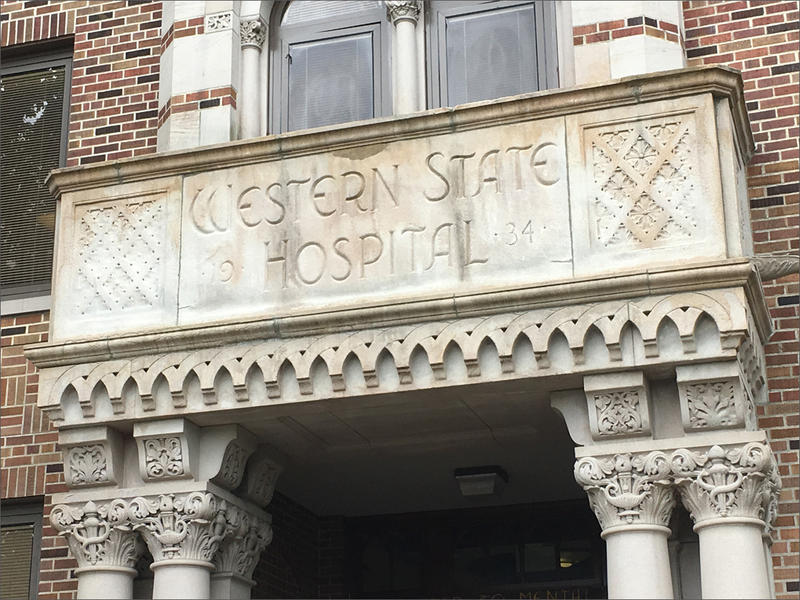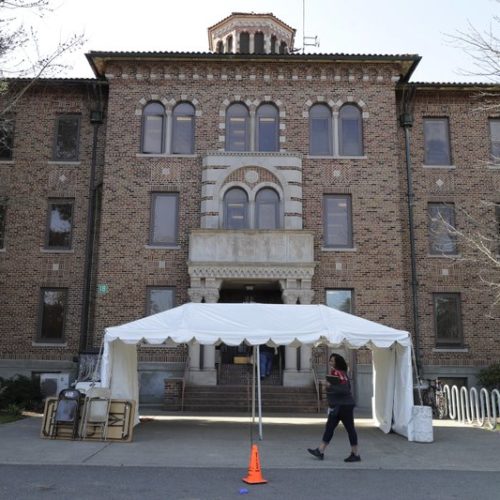
Western State, Washington’s Largest Psychiatric Hospital, To Lose Certification And Federal Funds
Listen
Despite a two year turnaround effort, the Centers for Medicare and Medicaid Services announced Monday that it will strip Washington’s Western State Hospital of federal certification for failing to comply with standards.
The termination of Medicare’s provider agreement with the state’s largest psychiatric hospital is a stunning blow and means the state of Washington will lose approximately $53 million in federal funding per year that goes to help operate the 857-bed hospital. That’s about 20-percent of the hospital’s annual operating cost of $278.4 million.
In May, federal surveyors conducted an unannounced follow-up inspection at Western State and determined that despite improvements, the hospital had not achieved what’s called “substantial compliance” with federal requirements.
In a notice posted to the CMS website on Monday, the Medicare program said Western State did not meet conditions in four areas including quality assessments, nursing services and physical environment.
Details on the survey findings were not immediately available. Federal funding will cease to flow to the hospital starting July 8.
In a statement, the Department of Social and Health Services Secretary Cheryl Strange said, “The hospital will continue providing care to patients and remains steadfast in its dedication to providing a safe and compliant hospital to serve people with mental illness.”
According to CMS, monitoring of care at Western State will continue under the Washington Department of Health.
The decertification of a state psychiatric hospital is not unprecedented. In 2005, CMS yanked federal funding for Vermont State Hospital in Waterbury and in Kansas the Osawatomie State Hospital lost its CMS certification in 2016, but later regained it, according to news reports.
In June 2016, Gov. Jay Inslee announced a 13-month turnaround agreement with CMS to prevent Western State from losing funding. Since then the state has received several extensions to continue.

File photo of Washington Gov. Jay Inslee and Cheryl Strange, former CEO of Western State and the current Secretary of the Department of Social and Health Services.
AUSTIN JENKINS / NORTHWEST NEWS NETWORK
Beginning in 2015, Western State Hospital was under scrutiny for serious repeat violations that inspectors said put patients and staff at risk. The litany of troubles included violent assaults on patients and staff, the 2016 escape of two high-risk patients and scores of unauthorized patient “walkaways.”
A “root cause” report in 2016 identified ineffective management, staff reductions and turnover leading to patients who felt “neglected” and a “culture of helplessness” among staff. A review by the Department of Corrections also found numerous security gaps including 25,000 unaccounted for master keys.
In recent years, new management has taken over the hospital and the state Legislature has put hundreds of millions of dollars into shoring up operations, including raising salaries in order to recruit more workers to address deep staffing shortages. But that investment has fallen short of what Inslee has said is needed to turn around the sprawling, decades-old hospital complex.
Last month, Strange, who previously served as the CEO of Western State, indicated that the hospital faced an uphill battle to comply with federal standards.
“Every day is a lift, every day is a focus on changing the culture, the violence,” Strange said.
She noted that a mock inspection in advance of the formal CMS inspection “showed us we still have quite a lot of work to do around the physical plant.” Parts of Western State Hospital are more than a century old.
About a third of Western’s patients are forensic patients who have been charged with a crime and been found not guilty by reason of insanity. The remaining patients have been civilly committed to the hospital because a judge has found they pose a risk of harm to themselves or others.
Even before this news, Inslee and a bipartisan group of lawmakers announced plans to stop admitting civil patients to Western and Eastern State Hospitals by 2023. Instead, those patients would be served in new 16-bed facilities around the state, allowing the state hospitals to focus on serving forensic patients.
“The time is long past for us to move forward addressing this problem with urgency,” wrote state Rep. Laurie Jinkins, D-Tacoma, in a tweet Monday. “People with mental illness can be successfully treated in their own communities. Let’s build those facilities NOW!”
“These findings help affirm that our plan is the right thing to do,” Inslee said in a statement Monday. “We need to provide our patients care in community-based facilities where they can be closer to friends and family.”
The state has accrued more than $55 million in fines for not meeting court-ordered timelines to evaluate and treat criminal defendants who are not competent to stand trial. That has led to mentally ill defendants languishing in jail cells while they await those services from the state hospitals.
Related Stories:

For The First Time, A Woman Will Lead Washington’s Department Of Corrections
For the first time in its 40-year history, the Washington Department of Corrections (DOC) will be led by a woman. On Thursday, Gov. Jay Inslee named Cheryl Strange as the agency’s next secretary.

COVID Cases At Washington’s Largest Psychiatric Hospital Top 200, As Staff Will Be Laid Off
COVID-19 has hit at least 158 hospital workers since March, which takes them off the schedule and means a lot of overtime for the workers left on the wards. At least 64 patients have tested positive and one has died. Making matters worse, the economic downturn that resulted from the pandemic, and the loss of revenues needed to run state government s forcing the Department of Social and Health Services to make budget cuts, including layoffs.

Concern High At Western State Hospital As Number Of COVID-19 Cases Grows
To date, 22 Western State Hospital (WSH) staff have tested positive for the virus. That number has more than quadrupled in two weeks. In addition, six patients have tested positive and one elderly patient has died. Claudio said with each additional positive case, her fear rises.















